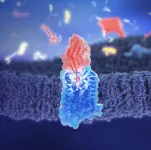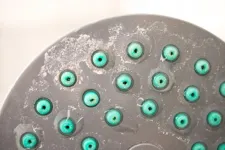(Press-News.org) Opioid drugs are highly effective at relieving pain but come with severe drawbacks. Their side effects range from dizziness to potentially fatal respiratory depression. Their illegal use contributes to nearly half a million deaths worldwide each year. Researchers from the University of Geneva (UNIGE) have discovered a molecule, called nanobody NbE, which binds tightly and durably to the cell receptors that usually bind to opioids, thereby blocking the drugs’ activity. Moreover, the scientists were able to create even smaller molecules that retain the same properties, which could prove far more effective than current treatments in mitigating the harmful effects of opioids. These findings are published in the journal Nature Communications.
Opioids are a large family of pharmaceuticals that include morphine, fentanyl and tramadol. These powerful drugs are mainly used as painkillers, but also trigger a euphoric effect by interacting with nerve cells in the brain. However, they are very addictive and produce dangerous side effects. Diverted from their original use, natural and synthetic opioids have become the deadliest drugs in the United States, and this global health crisis is now threatening Europe.
“We need to urgently develop new molecules to better mitigate the side effects for patients and manage the risks of opioid-related overdoses”, explains Miriam Stoeber, associate professor in the Department of Cell Physiology and Metabolism at UNIGE Faculty of Medicine, who initiated and coordinated the project. “To understand how a molecule works, we need to know how it affects the brain cells. In our study, we used tiny natural proteins derived from llama antibodies, called nanobodies, designed to bind specifically to the target receptor on the cell’s surface.”
The strong binding power of nanobody NbE
UNIGE researchers have found that NbE, one of the nanobodies under study, has the unique ability to bind so tightly and durably to specific opioid receptors that it prevents opioids from binding to these same receptors, therefore blocking the drug’s activity. “To determine how NbE binds to its target, we used high resolution structural biology methods, thanks to the new Dubochet Centre for Imaging”, describes Andreas Boland, assistant professor in the Department of Molecular and Cellular Biology at UNIGE Faculty of Science, and co-last author of the study. “We identified a unique binding mode where only a small portion of the nanobody is responsible for its correct receptor selectivity. Knowing precisely which part of the nanobody is at stake allows us to imagine new ways to induce the same effects with pharmaceuticals.”
Small molecules, large effects
While significantly smaller than antibodies, nanobodies remain quite large. They can be costly to produce and may not fully reach the target tissue in the body. In collaboration with the Prof. Steven Ballet team from the University of Brussels, the UNIGE research team synthesised in vitro a set of even smaller molecules mimicking the key part of NbE responsible for the selected binding to opioid receptors. “By durably blocking opioid receptors, our new molecules have the potential to reverse or reduce the deleterious side effects of opioids. In case of overdose, they could provide a better, longer lasting option than naloxone, the treatment currently in use. We will now refine their structure to improve even further their efficiency and facilitate their delivery to the targeted nerve cells in the brain”, concludes Miriam Stoeber.
END
Tiny antibodies to fight the dangerous effects of opioids
UNIGE researchers have discovered molecules capable of limiting the side effects of opioids by blocking the receptor responsible for their action.
2024-10-09
ELSE PRESS RELEASES FROM THIS DATE:
Researchers discover how plants produce a novel anti-stress molecule
2024-10-09
New research identifies for the first time the genes that help plants grow under stressful conditions - with implications for producing more sustainable food crops in the face of global climate change.
Led by the University of East Anglia (UEA), the study reveals the genes that enable plants to make a novel anti-stress molecule called dimethylsulfoniopropionate, or DMSP. It shows that most plants make DMSP, but that high-level DMSP production allows plants to grow at the coast, for example in salty conditions.
The research also shows that plants can be grown under other ...
You get your energy from your mom. A new study explains why
2024-10-09
It’s one of the basic tenets of biology: We get our DNA from our mom and our dad.
But one notable exception has perplexed scientists for decades: Most animals, including humans, inherit the DNA inside their mitochondria —the cell’s energy centers – from their mothers alone, with all traces of their father’s mitochondrial genome destroyed the moment sperm joins egg.
A new University of Colorado Boulder study published Oct. 4 in the journal Science Advances sheds new light on why this happens, showing that when the process fails, and paternal mitochondria slips into a developing embryo, it can lead to lasting neurological, behavioral and reproductive ...
Our food system is broken and we only have 60 harvests left, researchers warn
2024-10-09
Plant-based diets, compassionate agriculture, Indigenous methods, consumer pressure, new laws, international agreements and even vegan pets – these are the solutions for fixing our broken food and farming systems, say dozens of environmental advocates, researchers, farmers and industry pioneers in a new book.
Editors Joyce D’Silva and Carol McKenna sound the alarm in their introduction to Regenerative Farming and Sustainable Diets, warning that ‘our food system is broken’. Radical change is needed, they say, in our world where one‑third of food is lost or wasted, 780 million people ...
Viruses are teeming on your toothbrush, showerhead
2024-10-09
Step aside tropical rainforests and coral reefs — the latest hotspot to offer awe-inspiring biodiversity lies no further than your bathroom.
In a new Northwestern University-led study, microbiologists found that showerheads and toothbrushes are teeming with an extremely diverse collection of viruses — most of which have never been seen before.
Although this might sound ominous, the good news is these viruses don’t target people. They target bacteria.
The microorganisms collected in the study are bacteriophage, or “phage,” a type of virus that infects and replicates inside of bacteria. Although researchers know little about them, phage recently ...
Can weight-loss surgery help prevent pancreatic cancer in people with obesity?
2024-10-09
Obesity and type 2 diabetes are risk factors for various malignancies, including pancreatic cancer, which has a high death rate. A new analysis in Diabetes/Metabolism Research and Reviews suggests that weight-loss surgery—also called metabolic-bariatric surgery—may lower the risk of developing pancreatic cancer in people with obesity, especially in those who also have type 2 diabetes.
In the systematic review and meta-analysis, investigators identified 12 relevant studies that explored the effects of metabolic-bariatric surgery on pancreatic cancer incidence, with a total of 3,711,243 adults ...
Octopus-inspired adhesive works well in wet conditions
2024-10-09
In research published in Advanced Science, investigators drew inspiration from the octopus to develop an adhesive that achieves strong attachment and controlled release on varied substrates in wet and underwater environments. The feat could have numerous applications in fields ranging from healthcare and underwater robotics to infrastructure repair.
By studying the octopus’s suckers—specifically, the exposed disc-like portion called the infundibulum—the researchers designed an elastic, curved stalk with a membrane that can change its shape ...
Can adrenaline auto-injectors prevent fatal anaphylaxis?
2024-10-09
Individuals at risk of anaphylaxis—an acute systemic hypersensitivity reaction to an allergen or trigger, typically associated with skin reactions, nausea/vomiting, difficulty breathing, and shock—are often prescribed adrenaline (epinephrine) autoinjectors such as EpiPens. A recent review published in Clinical & Experimental Allergy finds that these autoinjectors, which people use to self-administer adrenaline into the muscle, can deliver high doses of adrenaline into the blood, but these levels are short-lived and may not be sufficient to save lives in cases of fatal anaphylaxis.
Investigators noted that data from animal and human studies ...
Insects from the bodies of illegally hunted rhinoceros may provide valuable forensic information
2024-10-09
New research in Medical and Veterinary Entomology reveals that when rhinoceros are found dead after being illegally killed by poachers, analyzing insects on the decomposing body aids in estimating the time since death. This information has been used by investigators and officials to construct cases against suspected perpetrators.
The study included 19 rhinoceros that were illegally killed and dehorned in the Republic of South Africa between 2014 and 2021. Scientists collected 74 samples of insect evidence from these rhinoceros remains, ...
Does outdoor play help protect toddlers against later childhood obesity?
2024-10-09
New research published in Acta Paediatrica suggests that children who engage in outdoor play during their preschool years have a lower risk of developing obesity later in childhood.
The study included children born in Japan during two weeks in January and July 2001. Of 53,575 children born, 42,812 had data on outdoor play habits at age 2.5 years. In a survey, parents were asked, “Where do your children usually play (excluding home residences and daycare centers attended)?” Available options for answers included “in my garden or on the grounds of my apartment complex,” “in parks,” “in natural areas such as ...
Caffeine is a heart-healthy habit
2024-10-09
A new paper in Rheumatology, published by Oxford University Press, finds that consuming more caffeine may improve heart health.
Vascular disease, damage of blood vessels, and their resulting consequences, heart attack and stroke, are among the leading causes of death in the general population. In patients with inflammatory rheumatic diseases, such as lupus and rheumatoid arthritis, these risks are even much higher. This is both due to the diseases themselves and some of the treatments for them, particularly cortisone derivatives.
Until ...
LAST 30 PRESS RELEASES:
EANM launches new award to accelerate alpha radioligand therapy research
Globe-trotting ancient ‘sea-salamander’ fossils rediscovered from Australia’s dawn of the Age of Dinosaurs
Roadmap for Europe’s biodiversity monitoring system
Novel camel antimicrobial peptides show promise against drug-resistant bacteria
Scientists discover why we know when to stop scratching an itch
A hidden reason inner ear cells die – and what it means for preventing hearing loss
Researchers discover how tuberculosis bacteria use a “stealth” mechanism to evade the immune system
New microscopy technique lets scientists see cells in unprecedented detail and color
Sometimes less is more: Scientists rethink how to pack medicine into tiny delivery capsules
Scientists build low-cost microscope to study living cells in zero gravity
The Biophysical Journal names Denis V. Titov the 2025 Paper of the Year-Early Career Investigator awardee
Scientists show how your body senses cold—and why menthol feels cool
Scientists deliver new molecule for getting DNA into cells
Study reveals insights about brain regions linked to OCD, informing potential treatments
Does ocean saltiness influence El Niño?
2026 Young Investigators: ONR celebrates new talent tackling warfighter challenges
Genetics help explain who gets the ‘telltale tingle’ from music, art and literature
Many Americans misunderstand medical aid in dying laws
Researchers publish landmark infectious disease study in ‘Science’
New NSF award supports innovative role-playing game approach to strengthening research security in academia
Kumar named to ACMA Emerging Leaders Program for 2026
AI language models could transform aquatic environmental risk assessment
New isotope tools reveal hidden pathways reshaping the global nitrogen cycle
Study reveals how antibiotic structure controls removal from water using biochar
Why chronic pain lasts longer in women: Immune cells offer clues
Toxic exposure creates epigenetic disease risk over 20 generations
More time spent on social media linked to steroid use intentions among boys and men
New study suggests a “kick it while it’s down” approach to cancer treatment could improve cure rates
Milken Institute, Ann Theodore Foundation launch new grant to support clinical trial for potential sarcoidosis treatment
New strategies boost effectiveness of CAR-NK therapy against cancer
[Press-News.org] Tiny antibodies to fight the dangerous effects of opioidsUNIGE researchers have discovered molecules capable of limiting the side effects of opioids by blocking the receptor responsible for their action.




